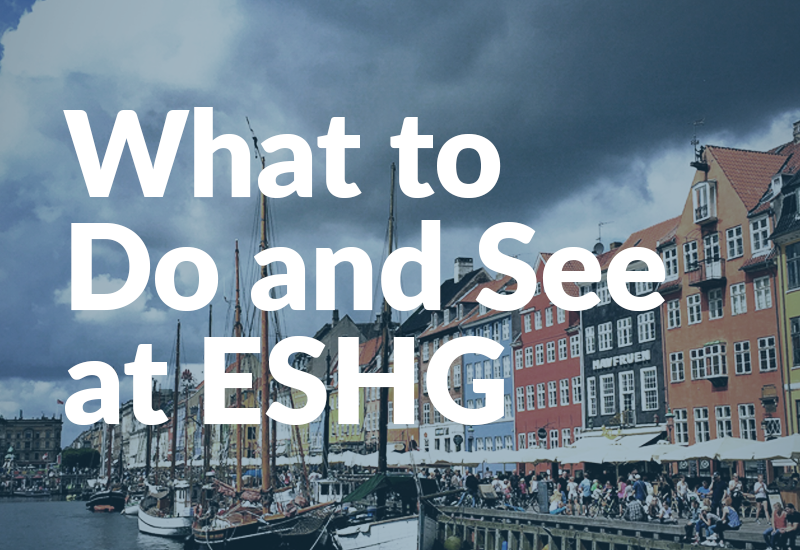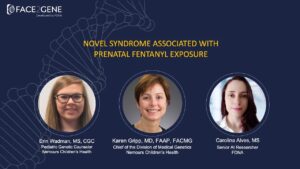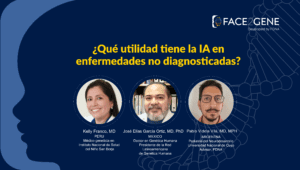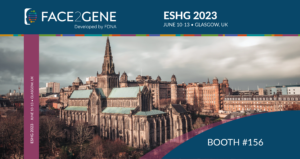A flock of researchers from around the globe shared their findings in dysmorphology and molecular genetics at this year’s ESHG as a part of FDNA’s corporate satellite talk and various scientific posters.
Karin Weiss (Rambam Health Care Campus, Haifa, Israel) presented her further work on Sifrim Hitz Weiss Syndrome (SIHIWES), a recently described form of syndromic intellectual disability identified through reverse phenotyping.
“When you come to classify the new case, there are some difficulties because the phenotype is not specific enough to make the diagnosis,” she said, adding “in this condition all the variants are missense.”
Weiss attempted to train Face2Gene on known SIHIWES cases and successfully taught the system to separate healthy individuals from those with SIHIWES, although the rate at which the system separates SIHIWES from different syndromes was not statistically significant. However, the system was able to notice the possibility of SIHIWES in two patients whose exome sequencing indicated de novo mutations outside the “hotspot” on the CHD4 gene, leading her to conclude that, “facial recognition can aid in variant interpretation probably by supporting a specific variant, not excluding.”
Antonio Martinez-Monseny, MD, (Hospital Sant Joan de Deu, Barcelona, Spain) reviewed how his team used Face2Gene to test several hypotheses, first training the system on PMM2-CDG with a mean accuracy of about 75 percent when comparing confirmed cases to unaffected controls and diagnosed cases of Angelman syndrome. He confirmed that there is indeed a “face” for the syndrome and that it is recognizable across ages, making it easier for clinicians to diagnose the syndrome at an earlier age and, he said, potentially improving access to therapies.
Peter Krawitz, MD, PhD (University of Bonn, Germany), explained how a web-based filtering and annotation tool, Deep Phenotyping, Deep Learning (DPDL) is powering his Prioritization of Exome Data by Image Analysis (PEDIA) approach with help from Face2Gene.
“DPDL can integrate multiple scores from the molecular and phenotypic level,” he noted. Currently, clinicians can use DPDL via the website, but it will soon be available through Face2Gene LABS as well.
Krawitz, who is also FDNA’s Chief Data Science Officer, emphasized how combining phenotypic and molecular information refines the results either could give alone.
“In a routine setting this will speed up your analysis from maybe several days to several hours,” he said.
Jean Tori Pantel (Charité – Universitätsmedizin Berlin, Germany) demonstrated the RESEARCH application with Face2Gene, which she is using as part of her thesis investigating computer vision applications for recognizing inborn errors of metabolism. Her lab was able to create separate masks (composite facial photos) for types of mucopolysaccharidoses that were previously undifferentiated. In the process, she created cohorts of varying size with and without confounding factors, eventually concluding that the distinguishability of cohorts improves as the cohort sizes increase, although the achievable maximum is still unclear.
Tzung Hsieh (Institute for Genomic Statistics and Bioinformatics, Bonn, Germany), whose poster was nominated for a “Best Poster” award, researched how patients with mutations in similar molecular pathways compare phenotypically.
Idan Menashe, PhD (Ben Gurion University of the Negev, Beersheva, Israel), shared his research on facial dysmorphisms as biomarkers for autism spectrum disorder. Using a cohort of 81 patients at the Negev Autism Center, Menashe and his team used the Face2Gene deep convolutional neural network to evaluate the photos, as well as those of controls, and compare the average faces of the case group and the control group. The groups showed clear separation, with a p-value less than 0.001. His team also evaluated the specific areas responsible for the separation and concluded that the upper facial area (eyes and nose) are most informative to the system.
In addition to these presentations, Yaron Gurovich, Karen Gripp, MD, and Ben Pode-Shakked, MD had scientific posters at ESHG showcasing how Face2Gene can be applied to research and how FDNA is improving the suite of phenotyping applications.



